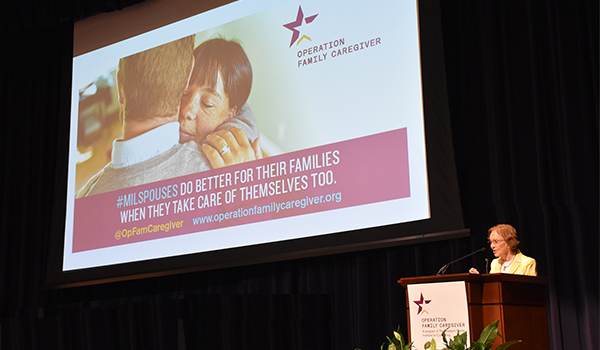
AAAA Family Forum / By Judy Konitzer and Chelsea Collins: After the tragedy of 9/11, legions of service members, Active Duty, National Guard, and Reservists were sent into battle. As they continue to transition home, however, many of these brave men and women face daunting circumstances.

Former First Lady Rosalynn Carter addresses attendees at the Uniting Forces To Support Military Caregivers Summit, July 29, 2016, at The Carter Center in Atlanta, Georgia / RCI COURTESY PHOTO
Of the more than 2.5 million deployed, more than 50,000 have been wounded in action. Additionally, severe effects of traumatic brain injury and post-traumatic stress are realities that make homecoming jarring, especially when these individuals have taken great pride in their strength, competence, and self-reliance. They are now forced to rely heavily on their loved ones for help.
Equally daunting are the overwhelming hardships for the unsung heroes who care for them. Young spouses and aging parents make up the majority of military caregivers, and in many cases, it is at the expense of their own health and well-being. Many are hesitant to ask for help or reluctant to admit they are overwhelmed. Family caregivers often receive little training how to deliver complicated care, are sometimes not treated as partners in their loved ones care, and often not encouraged to maintain their own health. Research shows caregivers are at increased risk for health, emotional, financial, and work-related problems.
Recognizing the Need
When President Jimmy and former First Lady Rosalynn Carter returned to Georgia from the White House, Rosalynn garnered her 40 years of interest in the mental health field and established a mental health program at The Carter Presidential Center in Atlanta, Georgia.
She had learned at an early age by caring for family members that “delivering quality care with love, respect and attention is both labor intensive and personally demanding.” The idea of working with caregivers for mentally and physically disabled, including the frail and elderly, spread through the community.
In 1987 the Rosalynn Carter Institute for Caregiving (RCI) began at Georgia Southwestern State University in her honor. Realizing the success of the Institute’s support for family and professional caregivers for families with varying degrees of long-term illness or disabilities, a new program, Operation Family Caregiver (OFC), was established in 2012 specifically to address the needs of military caregivers.
No Geographic Barriers
Specially trained coaches, working for community-based organizations across the country, visit the caregivers’ home, or meet by Skype/FaceTime, to customize a 16-24 week program that is unique to each family. Caregivers and their coaches develop strategies to help them get through tough times, overcome challenges, cope more effectively with problems they never imagined, and make plans to manage over the long term. Caregivers completing the program report being less depressed and more satisfied with their lives, have fewer health complaints, and are generally more prepared to take care of their families. The OFC program, after expansion to Washington and Nevada, will be in 14 locations in 10 states plus the District of Columbia.
Caregivers anywhere in the U.S. can be served as there are no geographic boundaries. More information can be found at www.operationfamilycaregiver.org.
OFC Collaboration
Capitalizing on partnerships with organizations offering specialized programs, an OFC summit Uniting Forces to Support Military Caregivers was held on July 29th at The Carter Presidential Center. Former First Lady Rosalynn Carter was joined by leaders from the White House, Elizabeth Dole Foundation, The U.S. Department of Veterans Affairs, Easter Seals Dixon Center, Military and Veteran Caregiver Network (MVCN), and Blue Star Families among others devoted to military families. The summit provided a forum for collaboration and exploration among the leaders, policymakers, military, and caregivers with the objectives to: (1) understand the heroic successes as well as the heartbreaking trials of military caregivers, (2) increase knowledge of the available caregiver supports, (3) continue to address hidden issues (domestic violence and others) and uplift our military service members, veterans, and their families, and (4) create concrete connections so military families can move forward and address their needs and those of their loved ones.
In her opening remarks, RCI Executive Director Dr. Leisa Easom said, “It is hard to imagine how difficult it is to be a husband or wife, or a parent, or even a friend, whose loved one comes home from war simply unrecognizable. He or she takes on this new role of ‘caregiver’ but also needs to adapt to how his or her own life has changed. As OFC extends into new communities, we can see the lasting impact it is having on military families.”
Chelsea Collins is the communications/web specialist at the Rosalynn Carter Institute for Caregivers at Georgia Southwestern State University, Americus, Georgia.
Judy Konitzer is the family forum editor for ARMY AVIATION; questions and suggestions can be directed to her at This email address is being protected from spambots. You need JavaScript enabled to view it..”>This email address is being protected from spambots. You need JavaScript enabled to view it..










